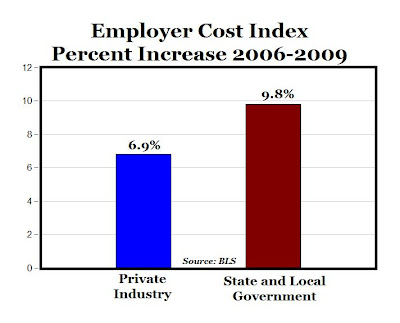The Two Americas: Public Sector vs. Private Sector
Note: This post was inspired by Michael Jahr's post on the Mackinac Center's website, "Economy Contracts, Government Expands."
 According to a December report from the BLS, state and local government employers spent an average of $39.83 per hour worked ($26.24 for wages and $13.60 for benefits) for total employee compensation in September 2009. Total employer compensation costs for private industry workers averaged $27.49 per hour ($19.45 for wages and $8.05 for benefits), see chart above. In other words, government employees make 45% more on average than private sector employees.
According to a December report from the BLS, state and local government employers spent an average of $39.83 per hour worked ($26.24 for wages and $13.60 for benefits) for total employee compensation in September 2009. Total employer compensation costs for private industry workers averaged $27.49 per hour ($19.45 for wages and $8.05 for benefits), see chart above. In other words, government employees make 45% more on average than private sector employees. According to another BLS report, compensation for private industry workers has increased by 6.9% between December 2006 and December 2009, compared to a 9.8% increase for government workers (state and local) over the same period.
According to another BLS report, compensation for private industry workers has increased by 6.9% between December 2006 and December 2009, compared to a 9.8% increase for government workers (state and local) over the same period.
 According to an analysis by USAToday (thanks to Michael Jahr for the pointer), "The number of federal workers earning six-figure salaries has exploded during the recession, according to an analysis of federal salary data." For example, the number of federal employees making $100,000 or more has increased by 120,595, from 262,163 employees in December 2007 to 382,758 in June 2009, for a 46% increase. The number of federal workers making $150,000 or more has more than doubled since the recession started, from about 30,000 to more than 66,000 (see chart above).
According to an analysis by USAToday (thanks to Michael Jahr for the pointer), "The number of federal workers earning six-figure salaries has exploded during the recession, according to an analysis of federal salary data." For example, the number of federal employees making $100,000 or more has increased by 120,595, from 262,163 employees in December 2007 to 382,758 in June 2009, for a 46% increase. The number of federal workers making $150,000 or more has more than doubled since the recession started, from about 30,000 to more than 66,000 (see chart above).
USA Today also reports that "When the recession started, the Transportation Department had only one person earning a salary of $170,000 or more. Eighteen months later, 1,690 employees had salaries above $170,000." That's a 168,900% increase!!
The final chart below shows the average unemployment since December 2007 for government workers (3%) and private-sector workers (7.9%), so the private sector has faced a jobless rate more than twice as high as the rate for government workers over the last several years.  MP: By every labor market measure, the public sector has done quite well and even expanded during the recession compared to the private sector. This has prompted Michael Jahr of the Mackinac Center to wonder whether recent government policies could lead to a long-run hollowing out of the private sector, i.e. could we be in the early stages of the "Detroitification" of the country?
MP: By every labor market measure, the public sector has done quite well and even expanded during the recession compared to the private sector. This has prompted Michael Jahr of the Mackinac Center to wonder whether recent government policies could lead to a long-run hollowing out of the private sector, i.e. could we be in the early stages of the "Detroitification" of the country?
Josh Barro writes for the Manhattan Institute about the "Two Americas" and the "sharp difference between two classes of employees: those who work in the private sector and those who work for the government. Workers in the public sector have experienced a very different recession from those in the private sector."
The preceding article is from one of our external contributors. It does not represent the opinion of Benzinga and has not been edited.
© 2025 Benzinga.com. Benzinga does not provide investment advice. All rights reserved.


